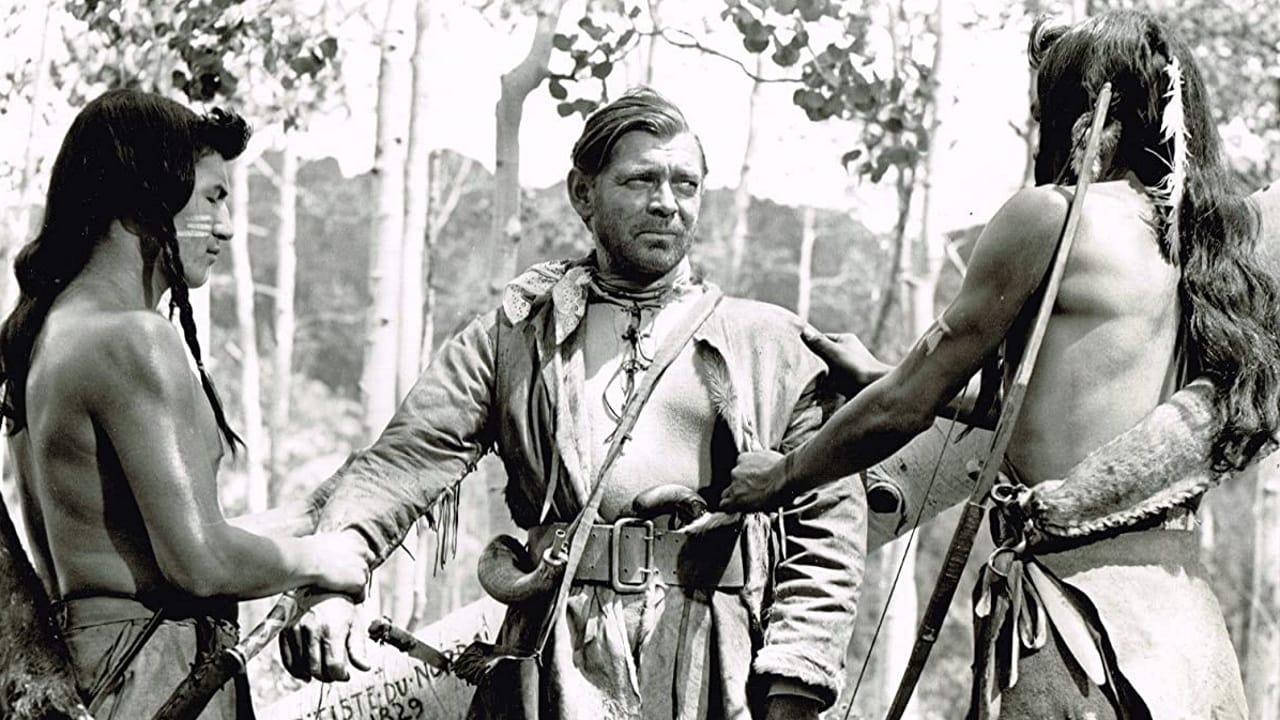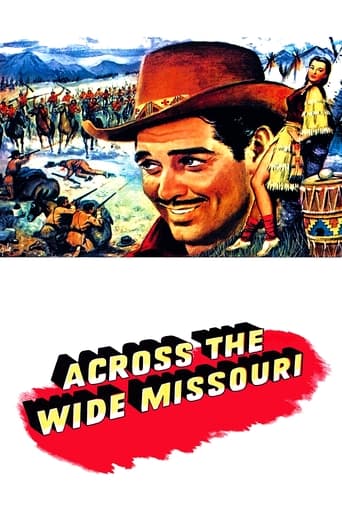



Expected more
Am I Missing Something?
A lot of fun.
Story: It's very simple but honestly that is fine.
Clark Gable's career was not the same after WWII, and he was not really "The King" any longer. But in "Across The Wide Missouri", Gable still shows some of the old magic. Although approaching 50, he still appears trim and athletic and flashes the toothy grin which was so appealing to his female fans. Here he is a fur trapper in a glossy Technicolor MGM western directed by Veteran William Wellman, who here seemed to copy John Ford's style of adding a third dimension by adding depth to the characters. Several reviewers have noted that the film was hacked up by studio heads and several action scenes were cut, to the detriment of the final product.I guess nowadays a western has to have a gritty, realistic look but this one is old-fashioned in that respect and has a clean and fresh aspect in the appearance of the characters and sets. I also thought the film was unevenly paced and with protracted stretches of inaction (perhaps due to the aforementioned editing). I'm not a film critic of a historian, just a moviegoer, but I can rate the overall entertainment value. I would recommend it on that basis, but I can't help thinking it could have been so much better.
View MoreThey were so close to having a good film here, but it is another case of a poor script destroying the quality work of all involved. Gable looks great...tan, fit, and masculine as hell. Speaking of masculine, Ricardo Montalban is the bare-chested Native American antagonist...this man has an over-powering charisma that makes it impossible to take your eyes off him. And another special mention must be made: Adolphe Menjou...he was absolutely fantastic as Gable's friend and translator. Truth be told, the whole cast is really wonderful, but as usual, the script gives them hokey garbage to utter to one another. And not just in English! The producers went to the trouble of having much of the script in French and various Native American languages, yet the script was dopey in all those languages. The storyline had great potential, but it wasn't realized well.The best part of the movie? The scenery. It was, by far, the most unbelievably gorgeous scenery ever put on film. Yes, there have been myriad other films with beautiful scenery, but they had beautiful SHOTS, whereas this movie has the scenery all the way through, behind every actor, in nearly every scene, and it is breathtaking. If this movie doesn't make you want to throw on a backpack and hiking boots and plan a trip to Colorado, then you need to make an appointment with a doctor...either an eye doctor, a psychiatrist, or both.There are a few nice moments throughout, but overall the film is pretty mediocre. The actors all look fantastic, and do the best with the script they've been given, but what speaks the loudest and makes the biggest impression is the scenery. They had all the parts, but couldn't make the whole...as they said on "Get Smart": "Missed it by THAT much!!"
View MoreOf all the directors ever to sit behind a camera Wellman could break your heart quicker than anyone. Even Ford. But this is one of his worst. Even he seemed to know it, probably from its jejune treatment, not much above a Bonanza or Big Valley. Yet there is one moment, typical Wellman that comes out of nowhere to shatter you, the death of the Indian wife of Gable. She has gone to give her baby some water and WHAM is killed by an arrow instantly. No warning. Nada. One of the most shocking, unprepared for deaths in all cinema. Particularly after investing a whole hour of love for the lady in what looked to be a sappy western. Of course the treatment of her afterwards is laden with Wellman's total indifference, apparently, to the film. Even so it is a reminder of the power he has always had at his best.
View MoreOne of the first 'liberal' Westerns that emerged tentatively in the 1950s, films showing that Indians weren't just bloodthirsty savages but peoples with their own culture and humanity. In making this ethical breakthrough, Wellmann doesn't reject the traditional, Fordian Western that had relegated the Native American to a whooping menace; instead, he embraces it. Like Ford's films, 'Missouri' is a history lesson, a tribute to the pioneers who 'tamed' America, 'giants' as the narrator calls them, the camera duly recording the suitably vast sky as a Wagnerian backdrop for these men. 'Missouri' records the development of a UNITED States, and not only does the film bring together a melting pot of different nationalties - Americans, Indians, Scots, French (who provide the kind of knockabout, Fordian 'humour' usually reserved for the Irish) etc., with their own tongues, stories, music etc. - but also a series of structural opposites (man/woman; nature/civilisation, capitalism, language) to create a national allegory of cohesion. Even the past and the future are brought together - the narrator tells of great doings in the past, stretching back at least as far as Waterloo, the Old World; but it is also his story, the tale of his birth, itself the literal and allegorical fruit of racial togetherness, the white man and red woman, even if the cheerful narration does sound conventionally WASPish.Of course, you can't create without destroying, and, as in all those folk tales and myths that express the primal hopes and fears of a people, the evil spirits have to be exorcised, in this case the renegade Indian Iron Shirt, who has the nerve to equate the white man's convenient desire for peace and mutual help with the loss of his own land. We shouldn't expect miracles in 1951; 'Missouri' is only as liberal as its times will allow it - only those Others that accept the White way of life are welcome. Although Mitchell and Kamiah seem to engage in a reciprocating process of teaching and initiation, it is Kamiah who is infantilised, who is brought back to her grandfather, who is put across her husband's lap and smacked for disobedience, i.e. for following her own instincts and customs. Iron Shirt, rightly hostile to a people who only see the awesome beauty of the Missouri landscape for the money it can make them, is demonised. The birth of the child is linked to the natural surroundings he is heir to; when Iron Shirt tries to kill him, his transgression is clearly unnatural, just as his unwillingness to see the white point of view and give in. In a world where translators (hence communication, conciliation) are the true currency of progress, Iron Shirt is a man of action and physical signs, not to be trusted.The film feels like a civic lecture, made to be shown to schoolchildren to teach them tolerance and the great American way. But Wellman has directed some of the most sombre Westerns ever made ('The Ox-Bow Incident', 'Yellow Sky'), where American progress has fatally turned in on itself, and the bright colours and cheerful tone here are deceptive. As if to warn us, he uses his characteristic montage zoom, whereby his camera pulls back from a composition, not by a zoom, but by cutting backwards at different angles from it, creating an eerie, distancing effect. The climax in the woods, as Mitchell fights Ironside, has a clear symbolic purpose, but it is the most chilling in the film, with no music. To root out the savage, Mitchell himself must become savage, using the Indian's tools to destroy him. He has become destructive and can no longer take part in the forging of a community, from which he voluntarily expels himself. In this story of nation, community and unity, this breach of withdrawal is troubling, and marks the film as a first step in the direction of the traditional Western's apotheosis, 'The Searchers'.
View More